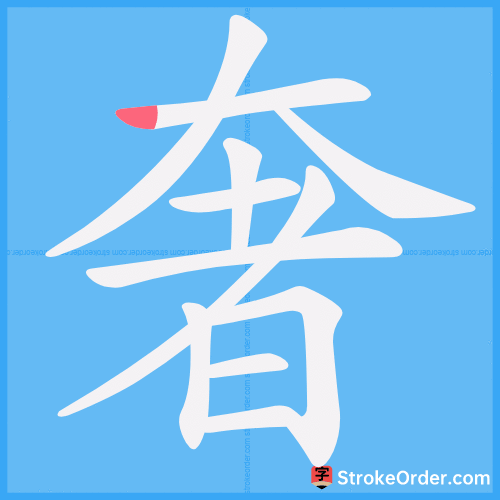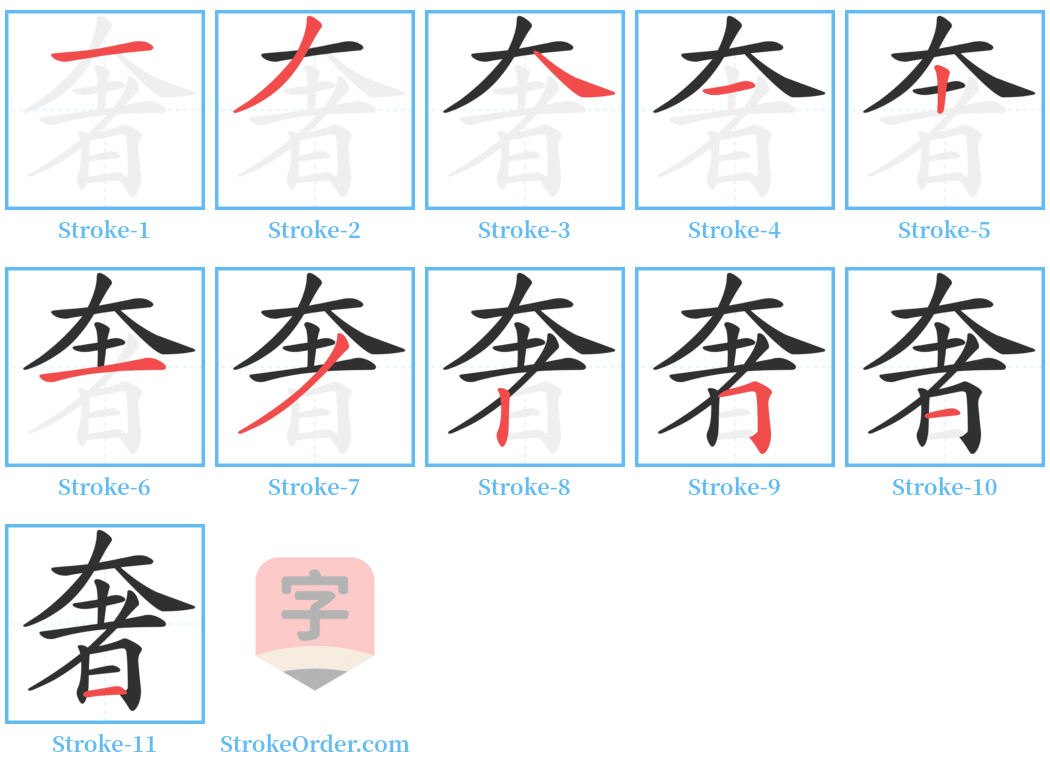奢 Stroke Order
Animated Stroke Order of 奢

Stroke Order Diagrams for 奢

Step-by-Step Handwriting Guide for 奢

Learn to Write Chinese Characters with Video Tutorials
Watch the video of writing the Chinese character "奢", learn the correct stroke order (笔顺) of the character "奢", and master the standard way of writing the character "奢".
Free Printable Handwriting Practice with Stroke Order: 奢
Printable Writing Practice Worksheet of "奢" in Portrait Orientation (Tian Zi Ge)

Printable Writing Practice Worksheet of "奢" in Landscape Orientation (Tian Zi Ge)

Information of 奢
Pinyin
shē
Radical
大
Strokes
11 strokes
Usage
★★★★★
Definition
extravagant
奢 [shē]
1. 用钱没有节制,过分享受。
(English: To use money without restraint, indulging excessively.)
2. 过分的。
(English: Excessive.)
3. 夸张。
(English: Exaggerated.)
奢 [shē] (形)
1. 同本义 (English: Luxurious; extravagant)
2. 过分 (English: Excessive)
3. 出色; 美好 (English: Fine)
引:
1. 《说文》:奢,张也。徐灏曰:“奢者侈靡放纵之义。故曰‘张’,言其张大也。”
(English: "Exklusivität" means to be lavish and extravagant. Hence the term 'exaggerated' refers to the act of being grand.)
2. 司马相如《子虚赋》:奢言淫乐而显侈靡。
(English: The extravagant words of indulgence are merely indulgent.)
3. 《论语·八佾》:礼,与其奢也,宁俭。
(English: Regarding rituals, it is better to be frugal than extravagant.)
4. 《韩非子·十过》:常以俭得之,以奢失之。
(English: It is often through frugality that one gains, and through extravagance that one loses.)
5. 《太平御览》引《说文》:反俭曰奢,言夸大于人也。
(English: To reverse frugality is to be extravagant, indicating exceedance over others.)
6. 唐·杜牧《阿房宫赋》:秦爱纷奢,人亦念其家。
(English: The Qin loved extravagance, and people remembered their household.)
7. 《后汉书·张衡传》:时国王骄奢,不遵典宪。
(English: At that time, the king was proud and extravagant, disregarding the laws and ordinances.)
例:
奢尚(奢侈的风尚); 奢欲(奢侈的欲望); 奢绮(奢侈华丽); 奢薄(风俗奢侈,人情,浇薄); 奢阔(奢侈阔绰); 奢愿(过分的愿望); 奢溢(奢侈过制); 奢僭(奢侈逾礼); 奢佚(骄奢放纵)
(English: Examples include extravagant fashion, desires, and extravagance in attire; wanton extravagance in character; luxurious wishes; excessive extravagance; lavish transgressions; indulgent extravagance.)
奢 [shē] (动)
1. 夸张,夸大 (English: Exaggerate; magnify)
2. 胜过 (English: Surpass)
3. 另见 shá (English: See also shá)
奢 [shá]
1. 姓 (English: Surname)
2. 另见 shē (English: See also shē)
引:
1. 明代有奢崇明。
(English: In the Ming Dynasty, there was a person named She Chongming.)
2. 另见 shē (English: See also shē)
Input Method for 奢
Pinyin
she1
Wubi
dftj
Cangjie
kjka
Zhengma
gdbm
Four Corner
40604
Unicode
U+5962
Same Pronunciation Characters